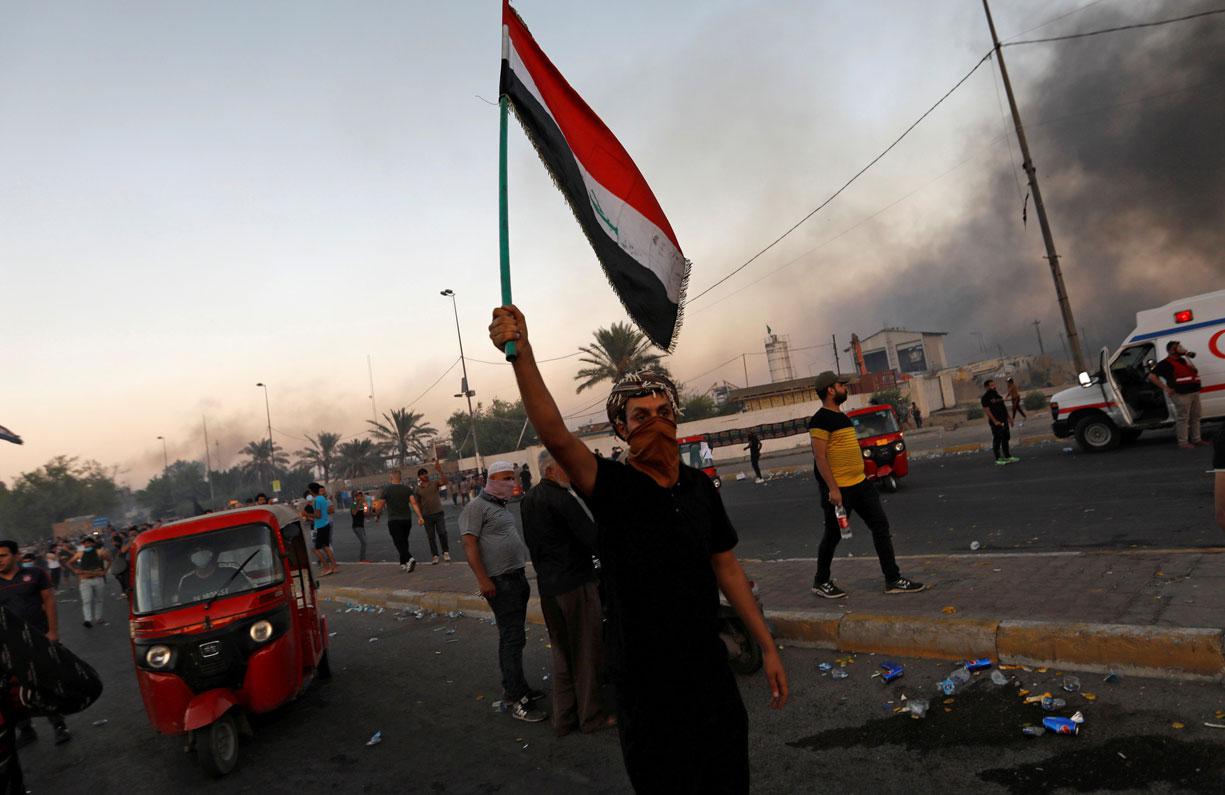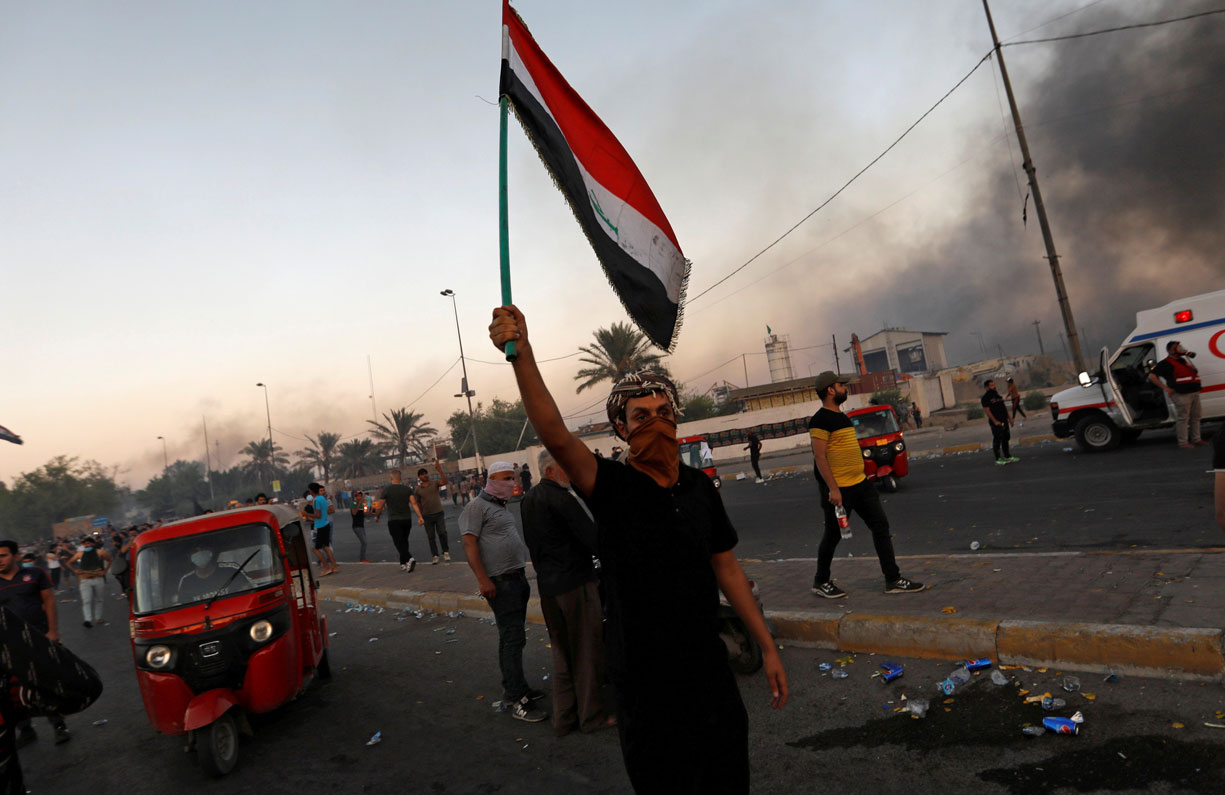Deadly protests see Iran, US vie for position in Iraq
BAGHDAD - Iraq's deadliest wave of protests since the 2003 ouster of dictator Saddam Hussein has made the country vulnerable to a battle for influence between its two main competing allies, the United States and Iran, analysts say.
The anti-government protests that erupted on October 1 echoed the demands that young Iraqis have made over recent years.
But the demonstrations played out differently this time, as tensions spiralled between the US and Iran.
"Without this context, Iran would not have intervened," Iraqi political analyst Munqith Dagher said.
Tehran denounced the week of demonstrations that shook Baghdad and southern Iraq as a "conspiracy" that "failed".
This response cost Iran "a lot of credit and support in Iraq, especially among Shiites," said Dagher.
"But it sacrificed that in order to maintain the system in place in Iraq and to guard the country as an asset in negotiations with the United States."
Meanwhile Iraqi authorities, under pressure from the streets as well as political and religious forces, on Saturday increased the number of commissions to investigate the deaths of more than 100 people in the protests.
Authorities ordered the creation of two new investigatory commissions. One is led by Iraq's military command and expected to shed light on the deaths and wounded as well as attacks on public buildings and raids by unidentified gunmen on media.
The other, composed of representatives from the armed forces, parliament, the human rights commission and the judiciary will investigate and bring to justice soldiers who acted illegally.
This comes after a failed attempt in parliament on Thursday by lawmakers from former premier Haider al-Abadi's Victory Alliance to garner enough votes to summon Prime Minister Adel Abdel Mahdi.
From October 1 to 6, at least 108 people were killed and more than 6,000 wounded, according to the government's Human Rights Commission.
'Conspiracy'
The wave of unrest has put Abdel Mahdi in a weaker position than ever, but he headed an unwieldy government even before recent developments.
The governing coalition includes Shiite populist cleric Moqtada al-Sadr - who won the most seats in the last parliamentary elections - and Fatah, the political arm of Hashed al-Shaabi, the paramilitary force dominated by pro-Iran groups.
As protests peaked, Sadr called for the government he helped form to resign.
The Hashed took the opposite position, saying it was ready to crush the "conspiracy" aiming to bring down the government.
Since then state institutions have been paralysed by division, effectively preventing concrete responses to protester demands for jobs, services and ending corruption.
Caught in the middle, Abdel Mahdi is "even weaker and more vulnerable to pressure from the largest political blocs," said Maria Fantappie, an International Crisis Group Iraq analyst.
This could favour Tehran, she said, as "the prime minister will be increasingly dependent on Iran's ally Fatah, which has stood by his side during the crisis". Abdel Mahdi was brought to power in Iraq with the backing of Iran-aligned political and paramilitary groups.
Polarisation is complicating the premier's pursuit of "a foreign policy aimed at insulating the country from the unfolding US-Iran competition," Fantappie said.
But in a crisis-ridden and increasingly fractured region, a country like Iraq - which attempts to maintain relations with all, from Iran to the United States, Saudi Arabia to Syria - is a major asset for all.
Neither Washington nor Tehran "would like to see the situation spin out of control," Fantappie said.
A stable Iraq is vital for Iran. Stifled by US sanctions, Tehran is committed to maintaining its six billion euro ($6.6 billion) annual exports to Iraq.
Likewise Washington needs Iraq to contain the danger of a resurgent Islamic State group, and to keep Iran's regional influence in check.
'Pandora's box'
The danger now, Fantappie said, is that some in the US administration interpret anti-Iran slogans by protesters as an opportunity to weaken Iran's position in the country. US officials who see Abdel Mahdi as indecisive and powerless may even push to replace him in light of the demonstrations, she said.
But this "could be like opening a Pandora's box, given a stagnating political system, mounting popular frustrations and the perennial difficulty of forming a government" in a country caught between rival powers.
The shifts in Iraq's political arena go beyond the pro-US and pro-Iran camps - other factions have also made moves since the start of the month.
Firebrand Sadr maintains the ability to paralyse the country by calling for sit-ins - as he has done in the past.
Grand Ayatollah Ali Sistani, Iraq's highest Shiite spiritual leader, said in his sermon Friday that he "had no interest in any party in power" and only defended "the interests of the people".
Sistani also upped the pressure on authorities by demanding answers for the deaths of protesters.
"The government is responsible when, under the eye of law enforcement, protesters are fired on illegally and media are beaten or attacked to terrorise their employees," he said.
Sistani, who wields significant power to influence the government, gave authorities "two weeks" to release the findings of the promised investigations.
The prime minister's office said the creation of the newly announced commission set to investigate military personnel, comes "in response to Grand Ayatollah Sistani's sermon".
The vast majority of Iraqis killed were protesters demanding an end to rampant corruption and chronic unemployment who were shot by live rounds. Authorities have blamed "unidentified snipers".
But human rights advocates and the growing numbers of Iraqis who have been able to access social media via channels bypassing restrictions in the country or from abroad, disagree.
They hold security forces responsible for the bloodshed: either by firing themselves or not protecting protesters from the "unidentified snipers" who infiltrated the demonstrations. Some have gone so far as to allege that those snipers were sent by Iran to quell the protests.
So far, authorities have accepted responsibility for two incidents.
They have acknowledged that the military had used "excessive force" in the Shiite bastion of Sadr City in Baghdad and say anti-riot police were responsible for the killing of a protester in Babylon south of the capital.
Even as calm appears to have returned to Iraq, the protests may yet be rekindled, particularly if public anger grows as videos showing last week's crackdown continue to circulate online.


